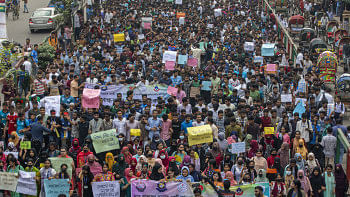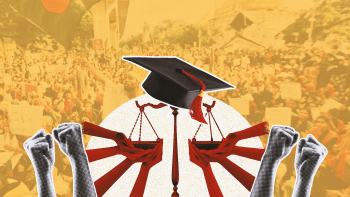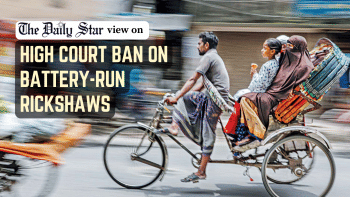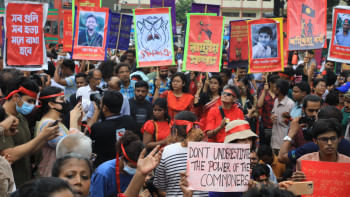Of frequent demands and conspiracies

A spectre is haunting Bangladesh. Any group staging protests to press home their demands is quickly labelled as "ghosts" of the previous regime. Demands are seen as conspiracies to unsettle the government, and exorcising the spirit has become a priority for those running the show.
This is a narrative that we have seen promoted by successive regimes. Old habits die hard. The apparitions of political sectarianism are reappearing. The pedal rickshaw pullers, the students demanding universities, the injured July protesters seeking government attention—anyone with demands is being othered, and often dehumanised. Viewing the opponents as morally repugnant is part of a culture of political divisiveness that creates a feedback loop of hatred.
Perhaps 100-plus days since the regime change are not enough to talk about truth and reconciliation. But without a space for the "other" to come clean—be it legal or social—it will be difficult to establish political and economic stability. Our overseas partners need assurances that their investments are secure. Our entrepreneurs need the guarantee to run their businesses without hindrances. It can only happen when all citizens begin to feel safe and included.
The vandalism of "enemy" property or the exodus of businessmen close to the previous regime has added to our economic woes. The unemployment rate has shot up, and the lines before the subsidised food trucks are getting longer by the day. Depending simply on overseas bailouts and remittances will not mend the wounds inflicted by the stealing of money or a broken financial body. The chief adviser's declaration to include members of the former party only after due process of trials is a welcome move. It at least gives many the hope of seeing the emergence of a democratic system.
Democracy requires participation from all stakeholders. By privileging one body or opinion and silencing the rest can never be healthy for democracy. We have already seen how one clandestine group used the former government as a Trojan horse to foray into their realm. The detrimental process requires reform. Then again, it should be allowed only after following due diligence. Conversely, democracy is not synonymous with mobocracy where anything goes, and petty interests prevail over greater ones.
The perception of Awami League's return in different guises is something that is held by many. There may be some truth in the idea that groups of rickshaw pullers, garment workers, students, and other disgruntled people are being manipulated, though only those with institutional intelligence have insights into such matters. Common sense, however, dictates that the root cause of dissatisfaction needs to be extracted so that the bad tooth does not pain the entire body.
Dehumanising the "other" simply gives the government an excuse to ignore the core problems. The injured students who waylaid the health adviser, for instance, were quickly identified as students of Chhatra League who have taken advantage of the government's policies to rehabilitate July victims. Why there isn't a proper list of the injured is a question that we can ask. During the July uprising, we received regular updates of names and numbers. So what's stopping the authorities from preparing such lists now?
Similarly, the battery-run rickshaw drivers were called associates of various ward commissioners of the past regime. It is surprising that a government comprising many NGO leaders is announcing policies without thinking of the rehabilitation of those affected by said policies. There is a huge battery industry to aid the 40 lakh illegal battery-run rickshaws that are plying the streets around the country. Where will these people go? What will they do? Will they be pushed into crime?
If your livelihood is stripped away, do you really need to be a member of conspirators to take to the streets? What alternative routes or earning options are we proposing for them? The same goes for the idea of banning polythene. Without creating alternative carry-on bags, the decision ended up becoming a gimmick with the shelf life of a newspaper.
The demand for upscaling certain government colleges into public universities is another case of opportunism that should not be tolerated. The government has sought time to review the merit of the proposal, while the suspicion about the anarchy let loose by the students of said colleges is rife among the netizens.
This is solidified by the fact that one of the seven colleges affiliated with Dhaka University has broken ranks with its peers. The students of Government Titumir College believe that they have the necessary infrastructure to have their own university. Maybe they see many private universities in the city operating under the roofs of multi-storey buildings. Perhaps they are under the impression that they are adequately equipped to have a university of their own.
I think the University Grants Commission (UGC) should seriously consider merging universities to reverse the process of "quantity over quality" policy followed by the previous government. The populist attempt to have universities everywhere has spread our resources thin. Even in the US, struggling institutions are merged to bring them under consolidated management.
A decision of merger will give the right message to the aspiring colleges that feel that rebranding would add value to their degrees. The reality is, many of these institutions don't have the teachers with the right pedigree to teach at a tertiary level. They complain about the syllabuses and exam questions that are followed at the major public universities. This I can tell from my own experience of conducting exams at these colleges.
But when these students keep on blocking major streets or vandalising train, their motive becomes clear. They want to hit the iron when it is hot and soft. But it is time for the iron to be solid, without which there will be more copycat agitations. The actions taken by the military in dealing with the students of Dhaka College and City College were necessary. Students seem to be pursuing everything except education, which cannot be the norm. The actions, though regrettable, are the results of leniency shown for too long. The message needs to be loud and clear. Reform needs time. This is not the right time to make illogical demands. Fixing the state, as one popular graffiti tells us, will require further patience and sacrifices.
Those who gave their lives or got injured in the July-August uprising sought systemic change. Such change cannot come if everyone thinks in terms of personal agenda or vendetta. The ghost of conspiracy can be exorcised if we process the body through the required rites.
Dr Shamsad Mortuza is professor of English at Dhaka University.
Views expressed in this article are the author's own.
Follow The Daily Star Opinion on Facebook for the latest opinions, commentaries and analyses by experts and professionals. To contribute your article or letter to The Daily Star Opinion, see our guidelines for submission.

 For all latest news, follow The Daily Star's Google News channel.
For all latest news, follow The Daily Star's Google News channel. 











Comments